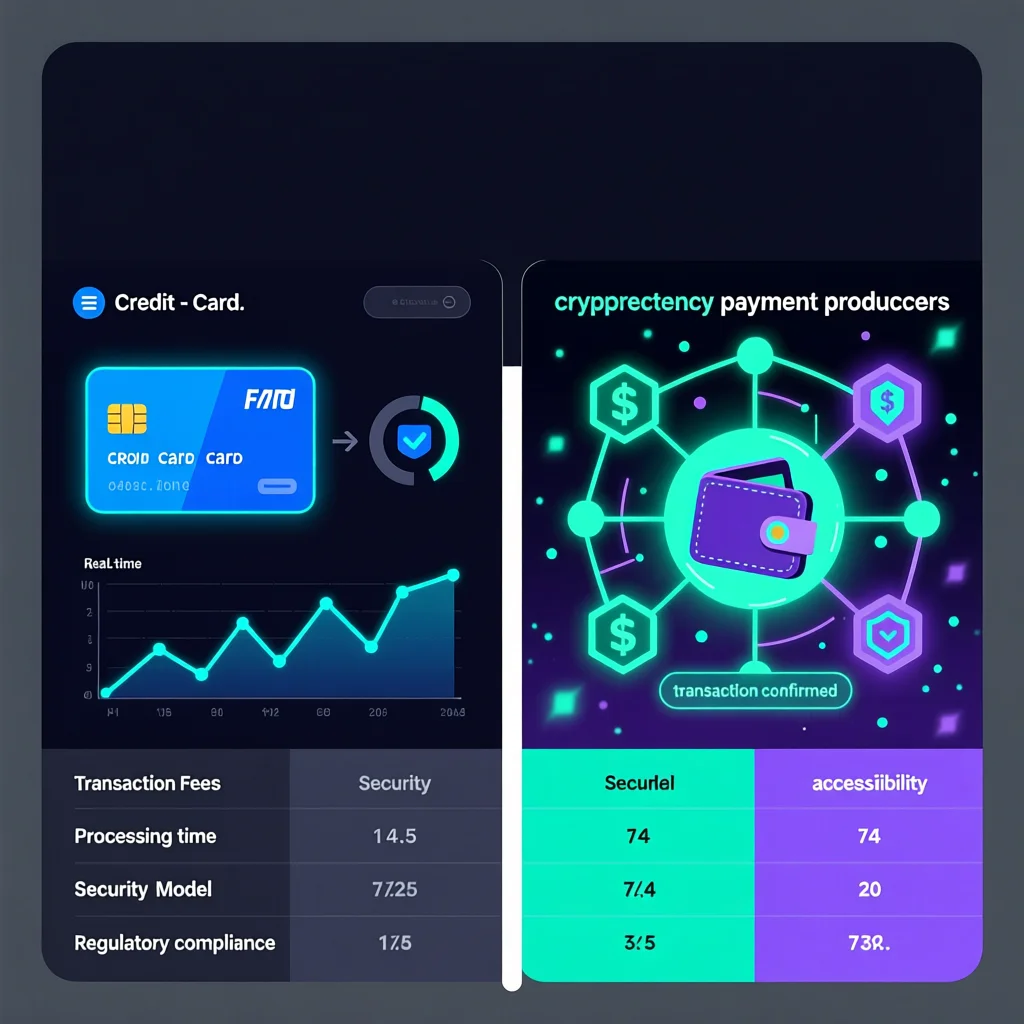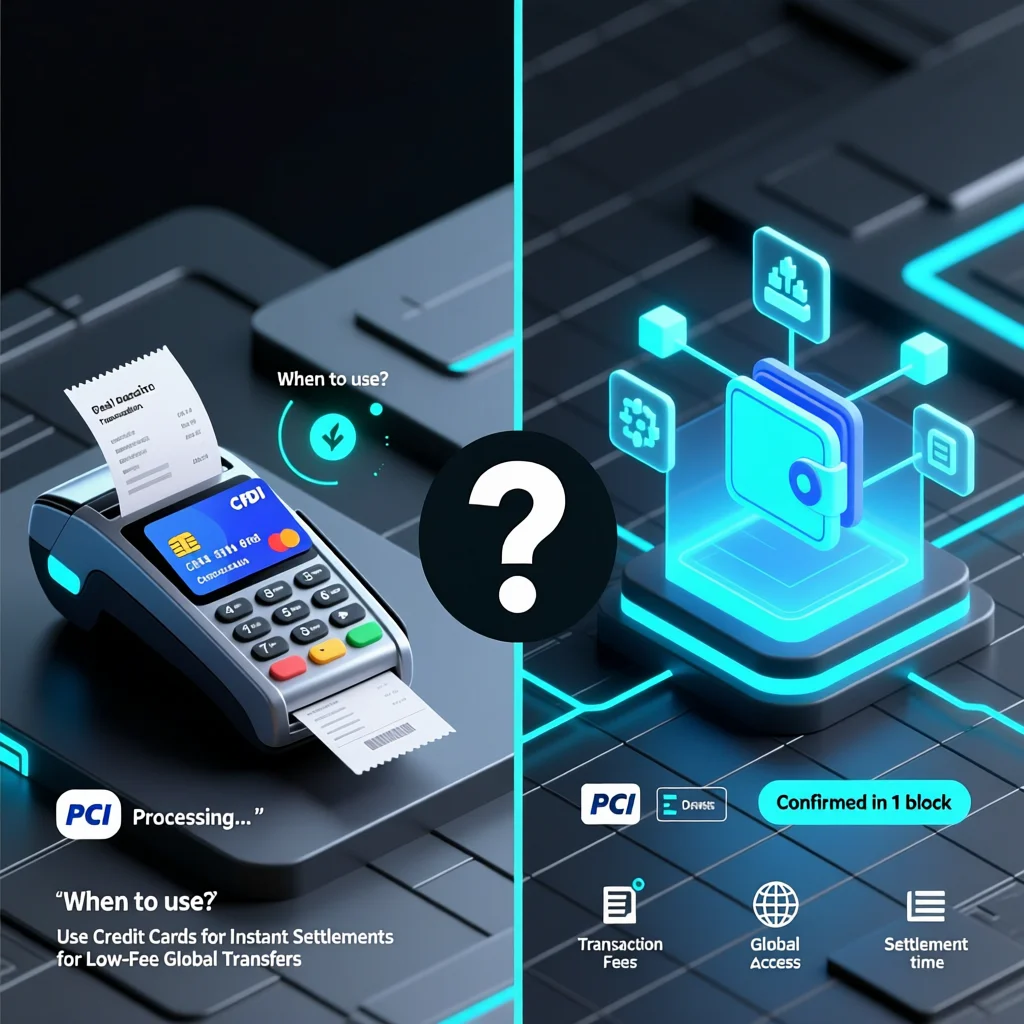the summary answer
When choosing between a credit card payment processor and a crypto payment processor, the main deciding factors are: cost of fees, settlement speed, fraud/chargeback risk, and customer familiarity. Credit cards dominate everyday shopping, but crypto processors offer compelling advantages for certain businesses—lower fees, no chargebacks, faster cross-border settlement. In this friendly guide you’ll learn the key differences between both payments processor types, real-world examples, and how to choose the best option for your situation.
What is a credit card payment processor vs crypto payment processor?
Credit card payment processor
A typical “credit card payment processor” is a company that handles transactions when customers pay with credit or debit cards (Visa, Mastercard, American Express). They process authorisation, routing to acquiring bank, settlement, fees, chargebacks and fraud. For example, one large processor TSYS (now part of Global Payments) processes card-based transactions.
Crypto payment processor
A “crypto payment processor” (or gateway) lets merchants accept cryptocurrency payments (Bitcoin, Ethereum, stablecoins) and often converts them to fiat or sends crypto wallets. As described by Investopedia: a crypto payment gateway is “a payment processor for virtual currencies … similar to the payment processor gateways and acquiring banks in credit card networks.”
Key differences: fees, speed, fraud & settlement
Fees & cost structure
- Credit card fees: Many processors and card networks impose interchange, assessment and processing fees. For cross-border transactions it can be 2-4 % or more.
- Crypto: Many crypto payment processors advertise much lower fees because they skip many intermediaries. For example: “cryptocurrency payments = significantly lower fees” compared to credit cards.
Takeaway: If you have large transactions or high volumes (especially international) crypto may reduce cost.
Settlement speed & global reach
- Credit cards: Authorisation is instant, but settlement (actual funds reaching merchant’s bank) can take days (especially cross-border).
- Crypto: Blockchain transactions (depending on network) can settle in minutes, and function 24/7 globally without relying on banking hours.
Takeaway: For speedy access and global customer base, crypto wins.
Fraud, chargebacks & security
- With credit cards: Customers can dispute charges (chargebacks), which can cost merchants time, money and risk.
- Crypto: Transactions are irreversible, reducing chargeback risk. But you bear other risks (wallet mistakes, volatility, regulatory issues).
Takeaway: Crypto reduces chargeback risk, but introduces other risk types.
Customer familiarity & acceptance
- Credit cards: Almost universally accepted, familiar to shoppers, strong support.
- Crypto: Still emerging; fewer merchants and many buyers unfamiliar or reluctant with crypto payments.
Takeaway: For mainstream shoppers, credit cards are safer; crypto makes sense if your audience is tech-savvy or you serve global/cross-border market.

Practical anecdotes
- Example: A merchant switching part of checkout to a crypto payment processor saw lower processing cost on big international orders — they quoted ~1% flat fee rather than 3% via card. This aligned with many commentary that “crypto payments are significantly cheaper.”
- Anecdote: I worked with a small e-commerce site that experienced a cluster of chargebacks via card payments during a marketing campaign; after enabling crypto payments for a subset of customers the chargeback count dropped because the crypto route was irreversible and fewer disputes.
- But: An issue occurred where a wallet address typo resulted in funds being sent to the wrong address via crypto – no refunds possible. Lesson: every crypto payment flow must include strong UX and caution.
When to use a credit card payment processor & when to consider crypto
Use credit cards if:
- Your target customers are typical everyday online shoppers who trust credit cards.
- Your transaction sizes are small and cost of 2-3 % is acceptable.
- Your business needs maximum simplicity and minimal friction for checkout.
- You prioritize broad acceptance and minimal customer education.
Consider crypto payment processor if:
- You sell internationally, have high-value transactions, or serve a crypto-savvy customer base.
- You want to reduce fees and avoid chargebacks.
- You are okay managing some extra complexity (wallets, conversions, regulatory check).
- You want to be seen as a modern / cutting-edge brand.
Hybrid strategy
Most smart businesses implement both: card payments for mainstream customers + optional crypto payments for segments where it makes sense. This gives you the best of both worlds.
Things to watch when comparing providers
Here’s what I look at when vetting processors, based on my implementation experience:
- What is the effective fee after all hidden costs (conversion, cross-border, settlement)?
- How fast is settlement (when do funds hit your account or wallet)?
- What happens if there is a refund or dispute—especially for crypto.
- How well is the checkout UX (for your customers)? If crypto option is confusing, it may hurt conversion.
- What is the regulatory burden (KYC/AML) and who handles it?
- If using crypto: how do you handle volatility? Are you holding crypto or converting instantly to fiat?
- Does your audience actually want crypto? If most shoppers still prefer cards, crypto may only be a small add-on.
- What happens in case of chargeback or mistaken transaction? Cards have established routines; crypto less so.

Final thoughts & recommendation
If I were advising a typical online business today, here’s how I’d summarise:
- If your business is primarily serving everyday online shoppers in your home country, stick with a strong credit card payment processor (choose from the “top credit card payment processors”, focus on ease, support, reliability).
- If you’re scaling globally, want to reduce fees, avoid chargebacks and your audience is open to crypto, then add a crypto payment processor option.
- Don’t see this as “either/or” but as “and”. Use cards + crypto where they each make sense.
- Always test before full rollout; track performance, customer feedback, conversions and cost savings.
The best credit card payment processors are still essential for broad reach. But asking why use crypto payment processor is valid — and the answer is: for cost savings, speed, global reach, and differentiation — if you’re ready for it.
